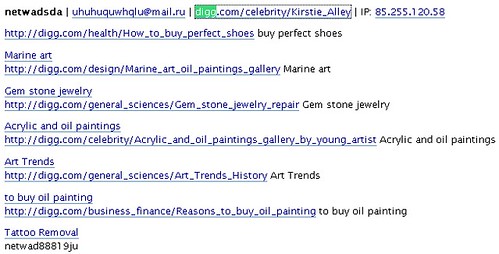 With yesterday being the Microsoft Zune official release and the fact that people are adamant about getting a Zune over all other such products out there, I’ve begun questioning how and why people choose to support certain brands.
With yesterday being the Microsoft Zune official release and the fact that people are adamant about getting a Zune over all other such products out there, I’ve begun questioning how and why people choose to support certain brands.
From recent Hitwise data, Google accounts for over 60% of search. Why doesn’t Google have more than 60% or closer to 70% or even 100%? Is it because the other approximately 40% believe that their search engine of choice is superior (which could very well be the case)? Do they hate the Google ads and not want to see them? Do the others simply not know about Google? Do they dislike monopolies? Or do these individuals in the minority simply not want to support the Google brand on principle?
Consider the hype surrounded by Microsoft (which I noticed was most prevalent in the Windows 98 era). Everyone chanted “Microsoft sucks,” though everyone continued buying Microsoft products and we saw no shortage or significant shifts that evidenced a market shift to something “superior.” Why is this so? Microsoft is what was easiest for everyone. Windows was what worked. Windows had more compatible applications, whereas other competing operating systems (MacOS, Linux) simply did not. Microsoft was the winning brand, but we still saw people, albeit in small numbers, change course.
chanted “Microsoft sucks,” though everyone continued buying Microsoft products and we saw no shortage or significant shifts that evidenced a market shift to something “superior.” Why is this so? Microsoft is what was easiest for everyone. Windows was what worked. Windows had more compatible applications, whereas other competing operating systems (MacOS, Linux) simply did not. Microsoft was the winning brand, but we still saw people, albeit in small numbers, change course.
 There are plenty of new Zune owners who waited this out simply because they refused to stand for iPods, which is the dominant player in the portable media market. Maybe they just don’t want to support a company with market domination. Maybe they think the iPods suck. Maybe they don’t want to use iTunes with their iPods (Anapod Explorer, anyone? It’s a great application, and for $30 extra with lifetime upgrades, it’s truly a steal). Whatever the reason, these individuals refused to be conventional, instead hoping for something that they hope works better (if that’s the real reason).
There are plenty of new Zune owners who waited this out simply because they refused to stand for iPods, which is the dominant player in the portable media market. Maybe they just don’t want to support a company with market domination. Maybe they think the iPods suck. Maybe they don’t want to use iTunes with their iPods (Anapod Explorer, anyone? It’s a great application, and for $30 extra with lifetime upgrades, it’s truly a steal). Whatever the reason, these individuals refused to be conventional, instead hoping for something that they hope works better (if that’s the real reason).
It obviously follows that some people will do what it takes to avoid the mainstream, but from an advertisement perspective, why? What do you need to do to sway that minority to use your product? Or on the other side of the coin, what do you need to offer your audience that will ensure that they buy your product despite the larger competition?
perspective, why? What do you need to do to sway that minority to use your product? Or on the other side of the coin, what do you need to offer your audience that will ensure that they buy your product despite the larger competition?
 Google wants to dominate. Why stop at 60%? Yahoo wants to kick Google out of first place. What can it do to sway the majority of users to go with the lower brand? (Do they just need to make more people hate Google?)
Google wants to dominate. Why stop at 60%? Yahoo wants to kick Google out of first place. What can it do to sway the majority of users to go with the lower brand? (Do they just need to make more people hate Google?)
Ultimately, is it the brand that these individuals are avoiding, or is it something else?




I find it very interesting that there is not a single comment on this post. Assuming that you really would like to know – and since I am definitely just the kind of person you are talking about in this post – I will make the time to answer.
I am a major proponent of making the world a better place through supporting independent small and online businesses and avoiding adding to the dangerous monopolistic power amassed by the few multi-national, publicly-traded plutocratic Corporations.
Having spent 23 years as a tech at IBM I know the history of the PC and owned some of the very first models. I know how Microsoft made sure each update would not work with non-Microsoft software and still forces us to upgrade to use even their own hardware. I know how they did away with Netscape. No brand who behaves in that manner can win me over no matter how creative or slick their marketing may be.
In spite of the challenges of not using Windows, I go out of my way to use the Ubuntu Operating System. When my favorite sites get absorbed by Google or Yahoo I immediately start looking for the next independent replacement.
Although I have Google accounts and even a gmail account, I will never use gmail as my primary email. Why would I voluntarily allow any entity to data-mine and store my personal interactions? Few realize the true power of data-mining but I do and have an entire category in my blog devoted to privacy and data-mining. (Many have gmail accounts associated with their own domains and don’t even know it!)
I encourage businesses and individuals to choose independent solutions and am especially concerned about the combined information Google now has because of their huge analytics market share. Every time I sign into a Google Analytics account and see an ecommerce site that relies on Google traffic for 70-90% of their sales I fear for their continued existence – even though they may not.
My favorite search engine is DuckDuckGo and I wish Zuula would add them so I can run their blog search against that search engine.
I am switching from FeedBurner to Feedblitz and am sorry that Yahoo absorbed both them and MyBlogLog. I loved FriendFeed and was very active there – until Facebook bought them. I still use it once in a while but my heart isn’t in it.
I love StumbleUpon but since they ignore their evangelists, don’t acknowledge suggestions, and sometimes ban quality sites the same way Google treats their users I would love to find a replacement. I would move on and never look back.
My primary email has been down more than it has been up lately which is a likely indication that they are being integrated and have run into technical difficulties. I found riseup.net today and they look good for being my new email provider so far.
Those who think the way I do know the world would be a better place if we supported small local and online businesses. That is easy to do: simply spend your time and money with them instead of publicly-held Corporations who focus almost exclusively on profits.
ha, well I wrote this over 3 years ago and this blog was a baby then, so it makes sense that there were no comments 😀
Thanks, Gail, for your insights. That’s REALLY interesting and it was fun to read. 🙂
Always happy to share especially with someone of your calibre. Someone once asked me whether I had an opinion on everything. My reply was only on the subjects I had researched and thought about which are myriad.